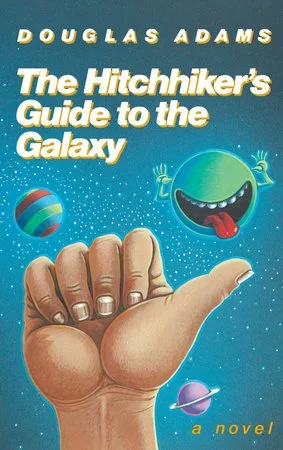“The Hitchhiker’s Guide to the Galaxy” by Douglas Adams
Reading Time: 3 minutes
The aim of this short article is to encourage the reading of this book and not to replace it. If you decide to purchase it through our affiliate link, we’ll get a few pence in our bank account and you’ll get a big thank you!Get the Book!
The Book Oversimplified
The Hitchhiker’s Guide to the Galaxy tells the story of Arthur Dent, a below-average Briton who happens to be the last survivor after the Earth is destroyed because of the Galaxy Local Authority. His travels through space make him face the absurdity of the universe, so big and incomprehensible that it’s kind of hilarious.
Quotes
“If there’s anything more important than my ego around, I want it caught and shot now.”
“I’d far rather be happy than right any day.”
“Isn’t it enough to see that a garden is beautiful without having to believe that there are fairies at the bottom of it too?”
“Don’t Panic.”
Takeaways
1. Scalability
If there is a book emblematic of British humour, The Hitchhiker’s Guide to the Galaxy is that book. And we’re talking about dated British humour. When I read it, I had been living in the UK for less than four years—which is not nearly long enough to become proficient in puns—and yet, it clicked.
Douglas Adams has sold millions of copies while his work has been translated into dozens of languages despite it being spectacularly British. How?
Well; Douglas Adams was a genius, and this, usually, tends to help. While there is not much you can do to become a genius, a more general lesson is hidden in the book concept and it can be useful for whatever creative endeavour you might want to bring to life. Just as many founders of fast-growing start-ups have been saying for decades: have an idea, then execute it. Think about how to scale it later. Yes, there is a limit to what you can scale—if you write a book about the history of your neighbourhood on the outskirts of Mottisfont, Hampshire, you may not have a great appeal to a busy Californian agent; but you never know. That’s why some Japanese and Chinese authors are so popular in the western world; readers don’t need to get 100% of what you wrote to enjoy your book (or your art in general). Even a reader with the potential to pick up everything will not do it. He’ll just focus on the parts he likes the most, which makes every reading experience different from any other. Remember: you don’t have to write for the world to be appreciated by the world.
2. How to approach the big questions
The Hitchhiker’s Guide to the Galaxy approaches with irony some challenges the humanity will have to face when dealing with the incomprehensible scale of the universe. It suggests that we are so far from understanding its nature, we cannot even ask the right questions. We think we are the smartest beings in the galaxy, but we may as well be completely unaware of whatever is taking place at our doorstep; like an ant in King’s Cross is unaware of the new skyscraper in the city. Authors have approached this subject from many angles—think about Lovecraft, for example—and, really, there isn’t a right way to do so. To be honest, I think that comedy is as good as any other way to tackle big problems. Also, it gives you freedom to talk about subjects which have been used and abused in the past. All you need to do is finding a new angle. Maybe a funny one.
Conclusion: 3/5
Get the Book from Amazon (UK)



